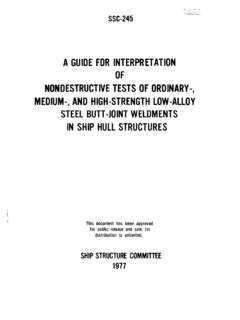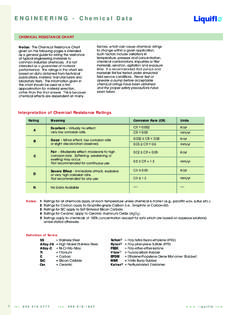Transcription of Testicular Biopsy and Sperm Extraction for Fertility ...
1 1 Testicular Biopsy and Sperm Extraction for Fertility Preservation This fact sheet aims to provide information about why and when a Testicular Biopsy or aspiration might be offered, what it involves, and the associated risks. The information does not replace talking to your doctors or nurses. It aims to act as a tool to help you prepare questions you can ask your healthcare team. Testicular Biopsy or needle aspiration involves removing a small amount of tissue from one or both testicles. The tissue is examined under a microscope to find out if Sperm are present and are able to be frozen (or used immediately) for Intracytoplasmic Sperm Injection (ICSI) - a specialised form of in vitro fertilization (IVF).
2 Some men with cancer may be offered this procedure if their treatment is known to cause possible infertility and they are unable to provide a semen sample or the sample shows no live Sperm for storage. Your testicles (testes) The testicles are two oval shaped glands found hanging in the pouch of skin (scrotum) just under the base of the penis. The testes play the central role in male reproduction. From puberty onwards they produce Sperm , which can fertilise a female egg. The testes also produce the male hormone testosterone. Testosterone aids in muscle development, hair growth, a deep voice, the ability to have an erection and sex drive (libido). Sperm production occurs in tightly packed, fine tubes (called seminiferous tubules ) and millions are made each day.
3 It takes about 70 days to complete a Sperm so that at any one time, Sperm at different stages of their development are present. When finished they are released into the tubule and travel into the epididymis. This is a coiled tube that lies at the back of the testes and connects to the vas deferens (the duct which transfers Sperm from the testicle to the urethra). At ejaculation, muscle contractions transport the Sperm from the epididymis through the vas deferens and into the ejaculatory ducts at the base of the bladder. Semen is the mixture of fluids from the testis but most comes from the seminal vesicles and prostate gland. Who will need a Testicular Biopsy and aspiration?
4 If you have cancer there are treatments that may interfere with your future Fertility . These can include: chemotherapy or radiation therapy 2 bone marrow therapy certain types of pelvic or Testicular surgery Fertility problems may only be for a short time until after your treatment is over. But for some men infertility can be permanent. You may be able to Sperm bank (see our Sperm banking fact sheet) before your treatment begins. However, some men may be making so few Sperm that they do not appear in their semen. Other men are unable to masturbate due to illness, stress or damage to nerves in the spine or pelvis. In this situation Testicular tissue can be taken during a Biopsy and be used for ICSI.
5 The procedure to take the tissue is known as Testicular Sperm Extraction . Before treatment begins it is important to discuss with your doctor how your treatment may affect your future Fertility . Read our Fertility preservation options for men with cancer factsheet for more detailed information about how cancer treatment can affect Fertility . The chance of being able to save Sperm from the Biopsy varies greatly and depends on your illness and past treatments. You will need to ask your doctor about the success rate in your particular situation. Types of biopsies There are two different types of biopsies. They are percutaneous and open Biopsy . Your doctor will discuss each with you and which one you will need.
6 Percutaneous Biopsy Also called a fine needle Biopsy , this method means inserting a fine needle through the skin into the testicle. Tissue is drawn into a syringe at the end of the needle. This is done using local anaesthetic: there is no incision or stitches. A variation on this method is called a core Biopsy . A larger, circular tissue cell sample is taken using a spring loaded syringe. Open/surgical Biopsy This method is more complex and involves your doctor making a cut into the skin and into the testicle. Tissue is taken (usually the size of one or two grains of rice) and stitches used to sew up the incision. This is done under general anaesthetic so it involves more risks.
7 There are different types ranging from a 3 simple Biopsy form to a micro- dissection procedure when the tubules of the testes are examined under an operating microscope. Sections of tubules that are thought to contain Sperm are removed. Before your Biopsy It is important to tell your doctor: If you are allergic to any medications Have any bleeding problems Are you taking anti- coagulant (blood thinning) drugs such as warfarin, heparin, aspirin or non- steroidal anti- inflammatory drugs (NSAID) such as Ibuprofen. About any other regular medications you take (name and dose) including any herbs, vitamins or other supplements. You will need to sign a consent form before the Biopsy .
8 This form says you understand what you are having, the possible complications and side effects. Talk to your doctor about any concerns you have before signing the consent. It is important you fully understand what is happening. If you are having a general anaesthetic you will need to stop eating and drinking a few hours before the procedure. The medical staff will inform you when you need to stop. You may be given a sedative to take before your procedure. If this is the case you will not be able to drive yourself to and from home or the hospital. Having the procedure A Testicular Biopsy is usually done as a day/outpatient procedure. It is performed by a surgeon called a urologist (doctor who deals with male reproductive organs).
9 It can be done in the hospital outpatient department or a special urology clinic. If you are having a general anaesthetic (where you go to sleep) you will need to come to the hospital a couple of hours before the procedure is done, and have fast prior to having the procedure. There will be an injection into a vein in your arm for the anaesthetic drugs to be given. Sometimes the procedure is done under local anaesthetic (where you are awake). You will lie on your back and the area around your scrotum will be shaved and cleaned with antiseptic. If you are having a local anaesthetic you will be given an injection under the skin into the scrotal area to numb it. This can sting a little but it will be over quickly.
10 You need 4 to stay as still as you can during the procedure. With a percutaneous Biopsy you may feel some pressure when the needle enters the testis and the Biopsy is taken. But it should not be painful. If you are having an open Biopsy the doctor will make a small incision into the skin. If it is done under local, you may feel a bit of pressure or discomfort at this stage. If you are asleep then you won t feel anything. The incision is closed with a few stitches, which should be dissolvable. Depending on the type of Biopsy , the procedure may take as little as 15 to 20 minutes or up to two hours for the mico- dissection method. Recovery If you had your Biopsy done under local anaesthetic you will be able to go home soon after the procedure.




